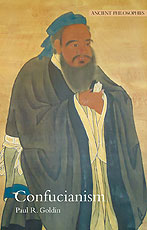"Confucius is the most influential thinker in Chinese civilization and the first whose philosophy can be reconstructed to any significant degree," writes Paul R. Goldin, Professor and Chair of the Department of East Asian Languages and Civilizations at the University of Pennsylvania. In this paperback, he offers a thoughtful overview of China's oldest and most revered philosophy. He looks at Confucius, who left behind no written work, and two other ancient thinkers: Mencius and Xunzi. In addition, Goldin comments on three anonymous texts: Great Learning, Canon of Filial Piety, and Application of Equilibrium.
"What you yourself do not desire, do not do to others" is the cornerstone of Confucian ethics. Sounds like the Golden Rule, doesn't it? Goldin covers this philosopher's recipe for good government, serving parents, the importance of obligation to kin, and carrying on with equanimity.
The author probes the moral theories of Mencius and discovers that he differs with Confucius on his views of human nature. Xunzi has become one of the most popular philosophers throughout East Asia and Goldin sees him as "the most complex philosopher that China has ever produced — and not coincidentally one of the most controversial." His views are discussed at some length including his ideas about human nature, our place in the cosmos, the meaning of rituals, and the significance of the heart-mind.
